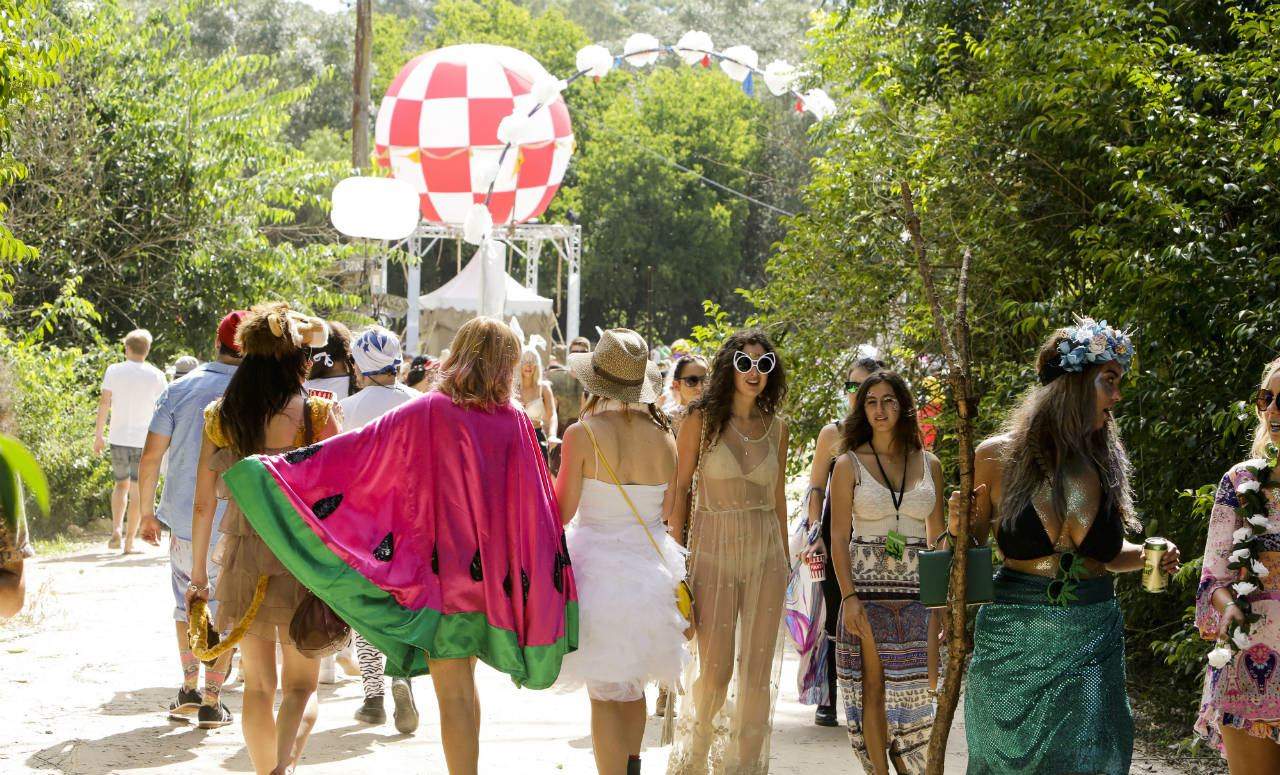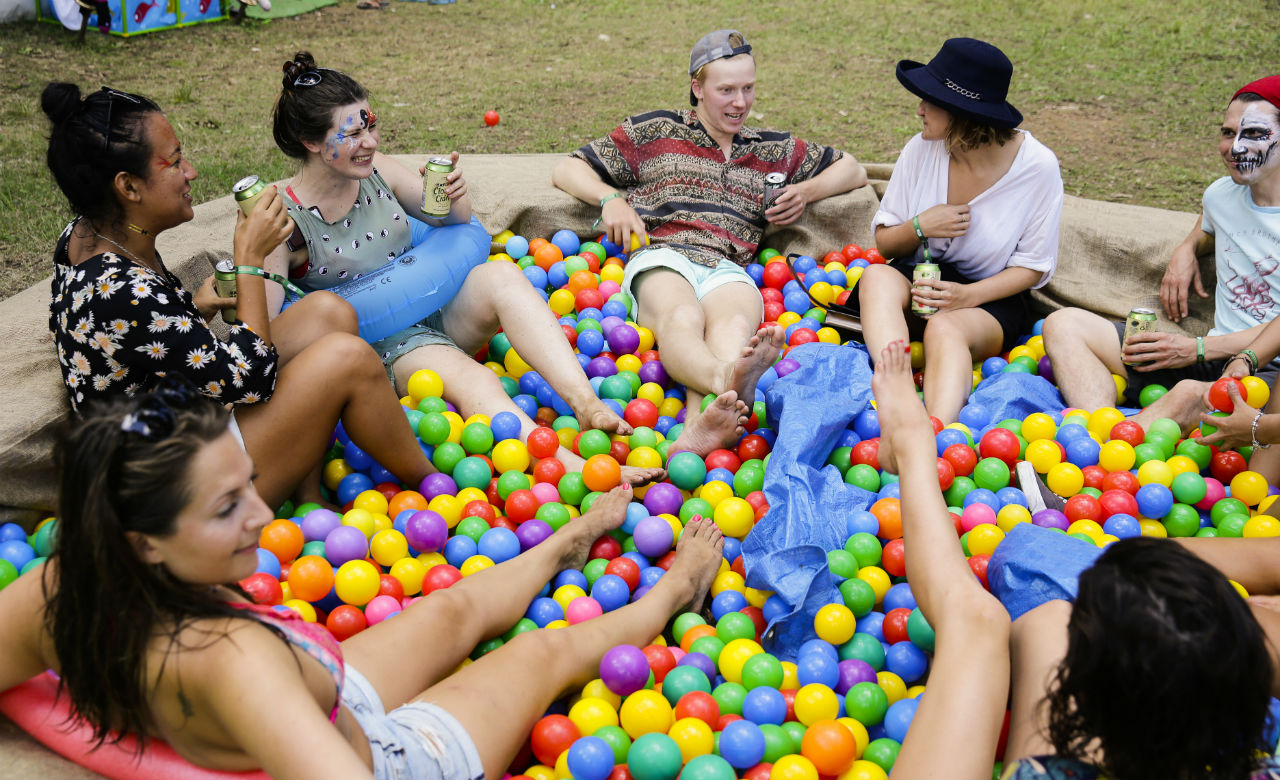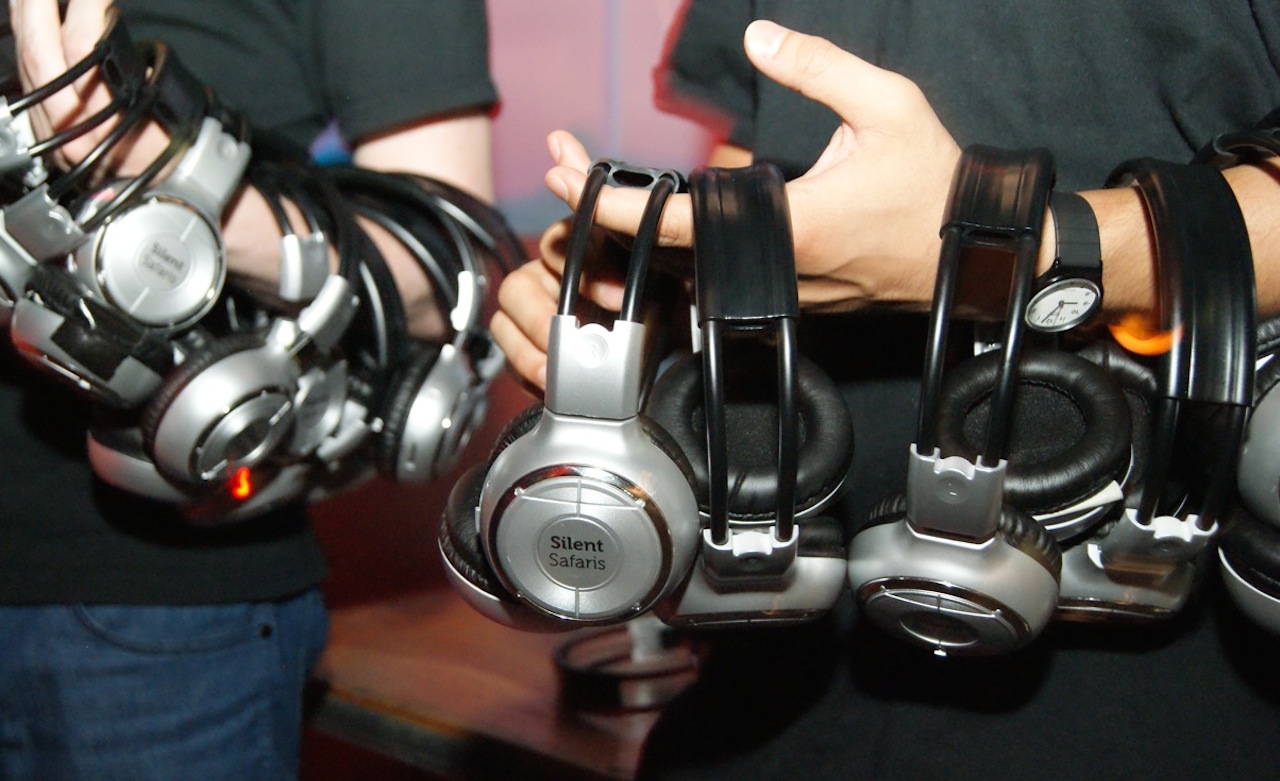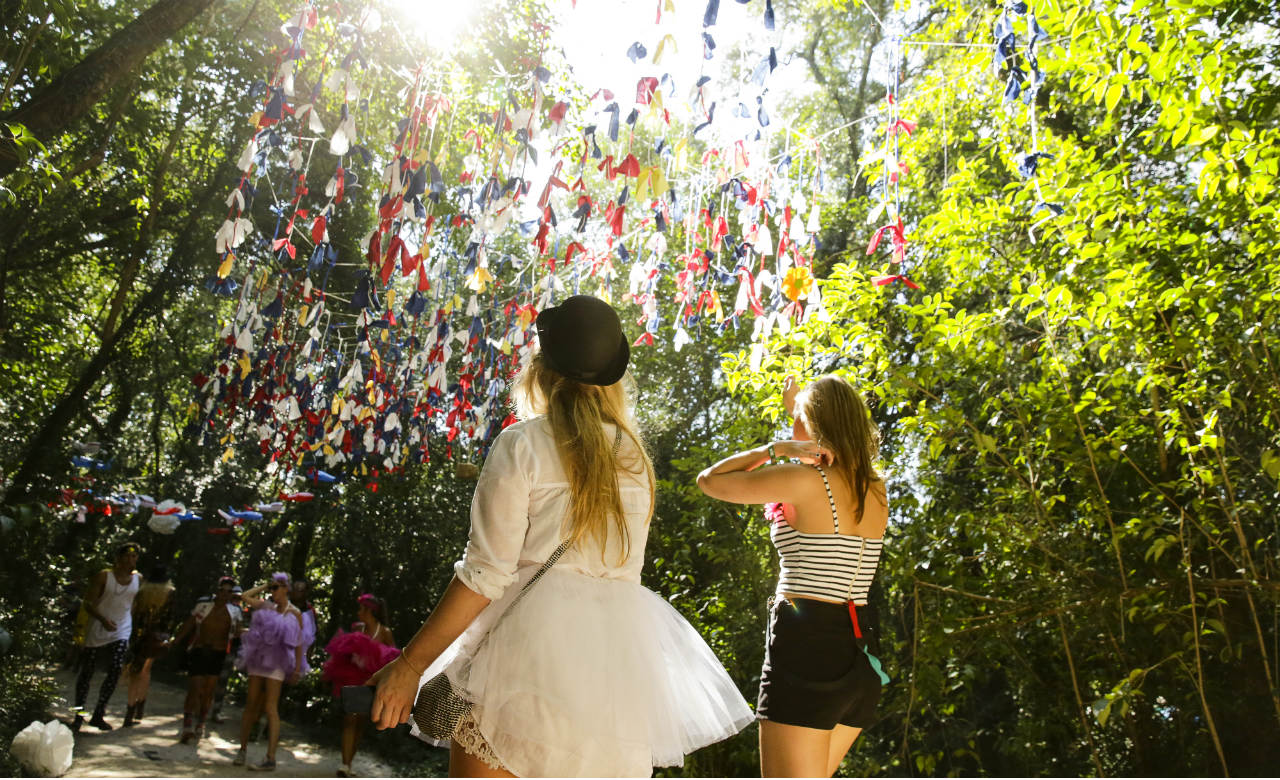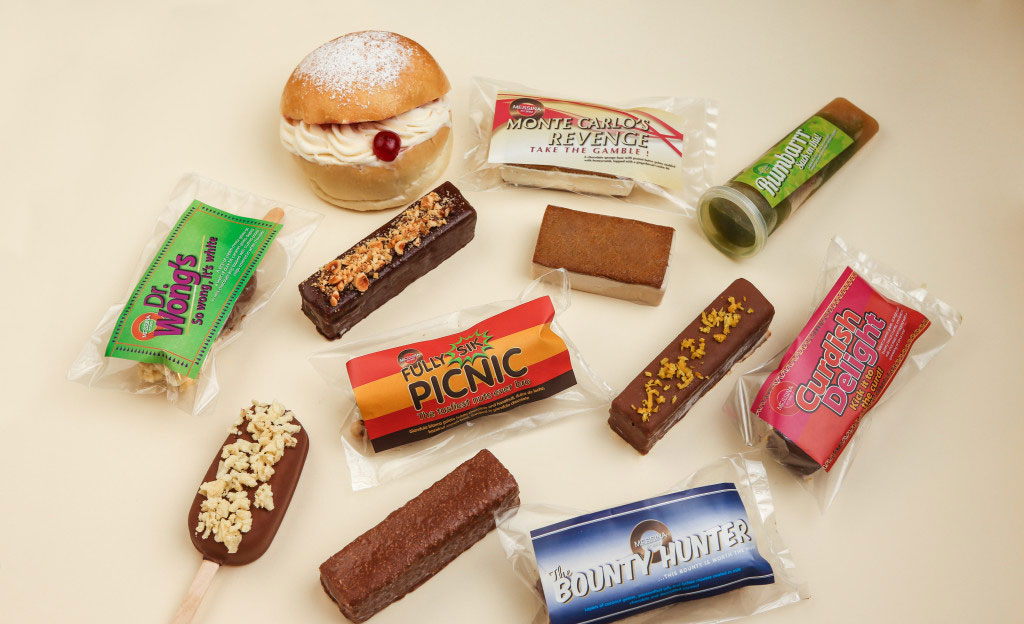The State of Fun in Australia
Gelato Messina, The Festivalists, Giant Dwarf and Secret Garden discuss active play, festival culture and whether red tape is killing creativity.
In partnership with
Fun: it’s not just for kids. As adults, fun opens our minds to new experiences, ideas and ways of being. It gives our brains time to switch off from the pressures of work, family and obligation. It can be productive, because through play we stumble on creative solutions. And it can be wonderfully, joyously unproductive. Anyone who's ever experienced the glee of shooting their friend in the bumper with a red turtle shell can attest to that.
So how much fun are you having, Australian city dwellers? Tyler Brule, speaking at Vivid Sydney last week, suggested the fun police are making Australia the "dumbest nation on earth". But some of Concrete Playground's favourite Sydney event organisers see the situation as a bit more complicated. We asked Mathieu Ravier, director of the Festivalists; Declan Lee, director and co-founder of Gelato Messina; Clare Downes, the founder of Secret Garden Festival; and Nikita Agzarian, the general manager of Giant Dwarf, about the state of fun in Australia.
They'll be continuing the discussion about event trends at our panel, 'The Art and Science of Fun: Creating Memorable Events and Experiences', at REMIX Sydney on Tuesday, June 2.
We all think kids should have fun and play. But why is fun important for adults?
Mathieu Ravier: Kids play out of indiscriminate curiosity, and an insatiable desire to learn, to make sense of the world. Most grown ups I know think they are more or less done with learning. Or are only interested in new experiences within a narrow spectrum: what they feel they know will interest them. As a result, adults lock themselves out of a whole range of experiences. "I don't like opera." "I don't go to museums." "Film festivals are not for me." Fun can be a way to trick grown ups into trying new things, into widening the scope of their experiences ... You might come to our Hijinks for an underwater drink at the aquarium with your mates, and end up learning something about conversation and wanting to get involved. You might get down in the Jurassic Lounge silent disco at the Australian Museum, then meet a scientist who shows you how to extract DNA from a strawberry.
Declan Lee: I think it's easy to forget to have fun as you get older. You can get caught up in the very serious nature of life sometimes. In the end, we 'work' to have fun, but sometimes we forget to actually ‘have’ fun and before you know it life is over! Fun keeps us creative, it reminds us what it feels like to be happy, and most importantly, it helps you smile.
Clare Downes: I think play is important for adults because it opens you up to possibility, friendship, experience and fun. When you're playing, you're not embarrassed or fearful. We encourage people to play at Secret Garden because we think play brings happiness and also it shifts the behaviour of the punters. When they are playing, punters are really open and kind to each other. They aren't taking themselves too seriously or behaving in an individualistic manner.
Nikita Agzarian: Being an adult in this era is pretty daunting. Everyone is always busy, constantly stimulated and accessible 24/7. Having fun and being engaged in something is more important than ever now, because the idea of switching off and immersing yourself in something that is purely in the now is becoming really foreign to us.
In his recent Vivid appearance, Tyler Brule said that Australia's nanny state, with all its rules and regulations, was at risk of making us the world's dumbest nation. Do you agree? What has been your own experience with red tape?
Mathieu: I agree with him, of course. Who wants a sanitised, over-regulated city that lives in fear of litigation and fun? But it's not all doom and gloom. The City of Sydney has done incredible work reducing red tape, and the mindset at council has evolved in leaps and bounds since I started The Festivalists ten years ago. I find that council is very receptive to new ideas, including one which remix or repurpose existing facilities. I also find the expression Nanny State problematic. We love to claim we don't need government protection, until those protections are taken away and we realize how much we took them for granted. The opposite of the nanny state, a deregulated Darwinian free-for-all ruled by the law of the market, is not necessarily conducive to risk-taking, shit-stirring or artistic creativity either. The biggest red tape, in my experience, isn't regulatory — it's laziness. The paradigm can change, but it requires a lot of long-term planning and hard work.
Declan: I agree wholeheartedly. I don’t particularly think we are at risk of becoming the dumbest nation but perhaps the most boring! Coming from the world of music festivals and clubs, I was faced with it constantly in my previous life. It comes up less these days, but entities such as local councils can certainly make life difficult at times. There needs to be rules and regulations for safety reasons without doubt, but the people making decisions need to be nurtured and encouraged to take more creative and holistic standpoints when deciding on what makes a city ‘live' and what makes a city vibrant. Without a little risk and without a little flurry outside of the box all you get is beige.
Nikita: I half agree and half don't. I think we have a lot of rules, but I also think that part of the problem with red tape is a lack of understanding of what is required, why it is even there and how to deal with it. Get your head around that and you can learn to navigate it. I spent the first half of my professional career working for the ABC and The Chaser collaboratively. I learnt so so much about the restrictions of red tape in that time and then conversely how to challenge those boundaries without getting arrested/deported/sued. When we first started Giant Dwarf, we had no idea what was required to run a venue, so we read everything. I can recite the Australian Building Code section H101 off by heart, I went to the council chambers archive and pulled up every document ever written about the building, I learnt the local government act, the live performance award, I became besties with OLGR. I wanted to know that if any regulatory body to the building, from anywhere, I knew exactly what to say. And I did, and every time I had someone check out the venue, it was a really positive experience.
Festivals are something Australia does very well — Sydney has more festivals per capita than just about anywhere else in the world. Why do festivals appeal to us so much? And can we have too much of a good thing?
Mathieu: There are obvious answers. We have weather that permits all kinds of large-scale outdoor events almost year-round. We have a very cosmopolitan population eager for arts that reflect its cultural diversity. We have a strong economy. But I think festivals are also popular here because we lack high-quality permanent year-round cultural infrastructure, and we lack the political willpower to fund the arts in a meaningful, sustainable, ambitious manner (one that allows experimentation, risk taking, and — occasionally — pissing people off). For example, there are over 60 annual film festivals in Sydney, versus only a handful in Paris, a city twice our size. It's not because we love film more than the French, it's because each week in Paris there are more than 300 different films screening in cinemas (at least a third of which are home-grown): the equivalent of two Sydney Film Festivals' worth of diverse, challenging feature films distributed theatrically, 52 weeks of the year. Maybe festivals are what happens when passionate individuals take it upon themselves to fill the major gaps left in the cultural fabric.
Declan: I don’t think you can have too much of a good thing, but you can certainly have too much of the same thing. I don’t actually think we do festivals terribly well here actually. Certainly in the music category anyway. We have a lot of one-day festivals, but they aren’t all good. And that's why there are a lot of failures. Not because [the market is] oversaturated, but because they are just boring. In general, festivals are communal and extremely sensory and people love that. That never gets boring. But there’s only so many flashing lights and DJs that one person can take. Everyone is scrambling to nail the 'food and music’ category at the moment, and the truth is its a great combination. But no doubt, at some point this will also become tired and fatigued and things will move on. New concepts and new ideas are essential for festivals to appeal. Change and innovation are exciting.
Clare: I believe festivals are so much more than what is being programmed or curated. I think festivals nurture community, where patrons feel this sense of belonging through a common interest with thousands of others, which is a wonderful feeling. I also think festivals offer a break from reality and a chance to broaden your mind, whether that be an afternoon at the writers' festival or a night marvelling at the Mardi Gras procession or disappearing into a music festival for 48 hours. And I don't think we can have too much of a good thing. The more festivals we have, the higher the standard. If the standard continues to improve, people will keep returning to festivals or start exploring other festivals. If the quality is good, the demand will continue to increase and the demographic will broaden — rather than what we see now (with music festivals in particular), which is that people tend to see it as a novelty thing to do when you're in your twenties.
Nikita: I'm going to answer this question wearing my three hats. As an audience member, festivals are great when they are done well. I love the vibe of Sydney right now. Between the Writers' Fest, Vivid and Sydney Film Festival, it's a great time to be in this city. As a venue, I have had some super positive experience with festivals in recent months. We've done great stuff with Sydney Comedy Festival, Sydney Writers' Festival and Vivid that have really helped us reach a new audience due to the targeted marketing that these guys can do that we just can't. But as a producer, I worry about the growth of festivals for the performers, especially in comedy. The more festivals there are and the bigger these festivals get, you really start to see it split the audience. Unfortunately, the hardest hit are those guys you might take a chance on, the up-and-comers, the people that probably need your money most.
What is your favourite kind of fun?
Mathieu: It used to be fun that allowed me to escape or to lose myself. As I've gotten older, it's become fun that allows me to find myself. My idea of fun is surprise and discovery with a little bit of learning thrown in.
Declan: Escapism — pretending to be someone else and stepping out of your normal world has got to be the best thing ever. Dressing up, making gelato look like a hotdog, whatever it might be. Pretending, for just a little while, is escapism at its best.
Clare: So Secret Garden is the best example what I think is good fun — a festival on a farm which has a drag queen stage, a pillow fort, a tiny rave cave and a kissing booth. A place where I can dance to Total Giovanni, marry a stranger and run around in a fancy dress costume with my best friends.
Nikita: I'm surrounded by fun. I run a comedy venue and while that's stressful, I get to laugh all the time. Other than that, fun to me is being with good company, eating good food, drinking good wine and dancing like an idiot.
REMIX Sydney is on at Sydney Town Hall on June 2 and 3.
Secret Garden images by Anna Warr.
